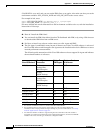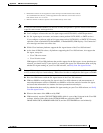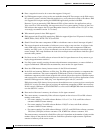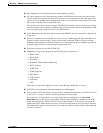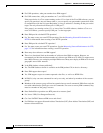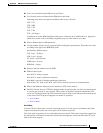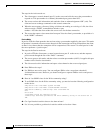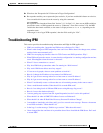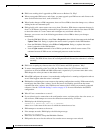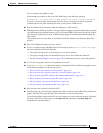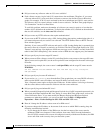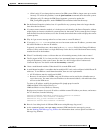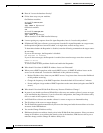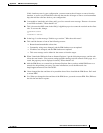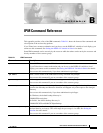
A-12
User Guide for Internetwork Performance Monitor
OL-11291-01
Appendix A IPM FAQs and Troubleshooting Tips
Troubleshooting IPM
Q.
IPM is not working after I upgraded my IPM servers to Release 2.6. Why?
A.
When you upgrade IPM servers and clients, you must upgrade your IPM servers and clients to the
same version and release level, such as Release 2.6.
Q.
When I make changes to IPM components, how can I force IPM to detect the changes now, without
waiting for the next automatic poll?
A.
IPM typically polls source routers once every hour. Therefore, IPM detects component changes in
from 1 to 59 minutes, depending on when the last poll occurred. (It can take up to two hours for IPM
to detect the reboot of a source router and reconfigure any associated collectors.)
However, you can use one of the following procedures to force IPM to detect your changes
immediately:
• From the IPM Main Window, select View > Properties, then click the timestamp under the Last
Update Time field. Doing so, updates the source router’s properties in the IPM database.
• From the IPM Main Window, select Edit > Configuration. Doing so, updates the source
router’s properties in the IPM database.
• Issue the ipm restart command to force IPM to synchronize with all source routers. This
command restarts all IPM servers and managed processes on the local host.
Note Use the ipm restart command only if you reconfigured your network and rebooted your
routers, and IPM did not detect the reconfiguration and rebooted, but otherwise is working
normally.
Q.
IPM is not accepting my timeout values for TCP Connect and DNS operations. Why?
A.
To ensure interoperability with Cisco IOS, the Timeout Values for TCP Connect and DNS
operations are fixed at 60000 and 9000 milliseconds, respectively. If you enter some other value,
IPM changes the value you enter to the default value.
Q.
When IPM configures the routers, it seems that the configuration is a running configuration and not
saved. What happens when the router is rebooted?
A.
IPM handles configuring the source router using running configurations entirely. IPM automatically
reconfigures the router after a reboot. You do not have to do anything special from the router
command line after a reboot. Also, IPM does not interact with or destroy any manually generated
collectors. See the “NVRAM Settings” section on page 4-35 for more information about RTR
configuration.
Q.
What if I lose a connection to a server?
A.
If your client loses its connection to the configuration server, real time poller, data view server, or
data collector, IPM attempts to recover the connection automatically, as follows:
1. IPM displays the following message:
Connection to server Lost. Will try to reconnect.
where server is the name of the server to which the connection was lost.
2. IPM attempts to reconnect to the server.
3. If the attempt succeeds, IPM displays the following message:
Reconnection Successful.
4. IPM closes all windows except the IPM Main Window.
5. IPM queries the server for the collector list to make sure no messages were missed.



